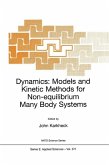This book is a first-hand account by one of the leading players in this field, which gives in-depth descriptions of analytical methods elucidating the complex evolution of nonlinear dissipative systems, and brings the reader to the forefront of current research.
Since the publication of the first edition, applications of the theory of nonlinear dynamics have been substantially extended to the novel area of active systems, largely motivated by problems of biophysics and biomorphic technology. These problems typically involve media with internal orientation. This new edition incorporates a chapter discussing dynamics of liquids and soft solids with internal orientation, including special features of their instabilities and motion of topological defects, which form the background for various applications to the motion of cells, tissues, and activated soft materials. The contents of the first edition have also been substantially reworked, improving graphics, emphasizing more complex secondary instabilities, and dropping some material pertaining to dynamical systems.
This book caters for graduate students and young researchers from many pertinent areas including applied mathematics, physical chemistry, chemical engineering and biophysics, as well as the seasoned scientist in search of a modern source of reference.
Dieser Download kann aus rechtlichen Gründen nur mit Rechnungsadresse in A, B, BG, CY, CZ, D, DK, EW, E, FIN, F, GR, HR, H, IRL, I, LT, L, LR, M, NL, PL, P, R, S, SLO, SK ausgeliefert werden.









